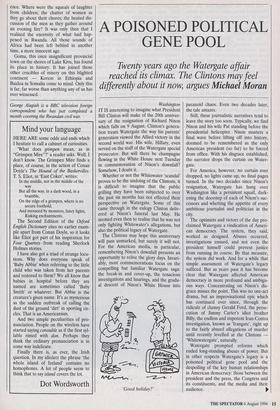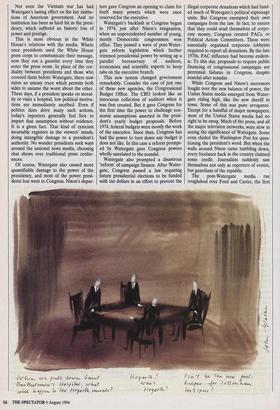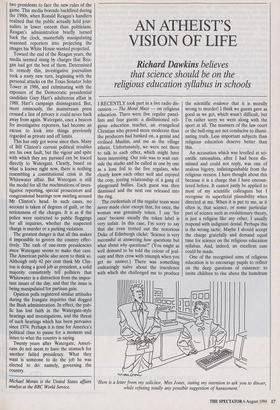A POISONED POLITICAL GENE POOL
Twenty years ago the Watergate affair reached its climax. The Clintons may feel differently about it now, argues Michael Moran
Washington IT IS interesting to imagine what President Bill Clinton will make of the 20th anniver- sary of the resignation of Richard Nixon which falls on 9 August. Clinton's genera- tion treats Watergate the way his parents' generation viewed the Allied victory in the second world war. His wife, Hillary, even served on the staff of the Watergate special prosecutor. But will there be champagne flowing in the White House next Tuesday in commemoration of Nixon's downfall? Somehow, I doubt it.
Whether or not the Whitewater 'scandal' proves to be the undoing of the Clintons, it is difficult to imagine that the public grilling they have been subjected to over the past six months has not effected their perspective on Watergate. Some of this came through in the eulogy Clinton deliv- ered at Nixon's funeral last May. He seemed even then to realise that he was not only fighting Whitewater's allegations, but also the political legacy of Watergate.
The Clintons may hope this anniversary will pass unmarked, but surely it will not. For the American media, in particular, remembering Nixon's downfall presents an opportunity to relive the glory days. Invari- ably, most commemorations focus on the compelling but familiar Watergate saga: the break-in and cover-up, the tenacious investigations and hearings, and the gradu- al descent of Nixon's White House into `Good holiday?' paranoid chaos. Even two decades later, the tale amazes.
Still, these journalistic narratives tend to leave the story too soon. Typically, we find Nixon and his wife Pat standing before the presidential helicopter. Nixon musters a final wave before lifting off into history, doomed to be remembered as the only American president (so far) to be forced from office. With his disgrace established, the narrator drops the curtain on Water- gate.
For America, however, no curtain ever dropped, no lights came up, no final pages turned. In the two decades since Nixon's resignation, Watergate has hung over Washington like a persistent squall, dark- ening the doorstep of each of Nixon's suc- cessors and whetting the appetite of every ambitious journalist and politician in the city.
The optimists and victors of the day pro- claimed Watergate a vindication of Ameri- can democracy. The system, they said, worked as designed. Abuses occurred, investigations ensued, and not even the president himself could prevent justice from running its course. By that measure, the system did work. And for a while that simple assessment of Watergate's legacy sufficed. But as years pass it has become clear that Watergate affected American democracy in more profound and ambigu- ous ways. Concentrating on Nixon's dis- grace misses the point. This was no one-act drama, but an improvisational epic which has continued ever since, through the ridicule of clumsy Gerald Ford, the perse- cution of Jimmy Carter's idiot brother Billy, the endless and impotent Iran-Contra investigation, known as grangate', right up to the fairly absurd allegations of murder until recently levelled at the Clintons — Whitewatergate', naturally.
Watergate prompted reforms which ended long-standing abuses of power. But in other respects Watergate's legacy is a poisoned political gene pool and the despoiling of the key human relationships in American democracy: those between the president and the press, the Congress and its constituents, and the media and their audience. Not even the Vietnam war has had Watergate's lasting effect on the key institu- tions of American government. And no institution has been as hard hit as the presi- dency, which suffered an historic loss of power and prestige.
This is most obvious in the White House's relations with the media. Where once presidents used the White House press corps to communicate their message, now they run a gauntlet every time they enter the press room. In place of the cor- diality between presidents and those who covered them before Watergate, there now exists an uneasy truce which permits both sides to assume the worst about the other. These days, if a president speaks on moral- ity or visits a hospital, low political motiva- tions are immediately ascribed. Even if politics does drive many such actions, today's reporters generally feel free to impart that assumption without evidence. It is a given fact. That kind of cynicism invariably registers in the viewers' minds, doing intangible damage to a president's authority. No wonder presidents seek ways around the national news media, choosing chat shows over traditional press confer- ences.
Of course, Watergate also caused more quantifiable damage to the power of the presidency, and most of the power presi- dents lost went to Congress. Nixon's depar- ture gave Congress an opening to claim for itself many powers which were once reserved for the executive.
Watergate's backlash in Congress began in 1974, just after Nixon's resignation, when an unprecedented number of young, mostly Democratic congressmen won office. They passed a wave of post-Water- gate reform legislation which further trimmed presidential power by setting up a parallel bureaucracy of auditors, economists and scientific experts to keep tabs on the executive branch.
This new system changed government remarkably. Consider the case of just one of these new agencies, the Congressional Budget Office. The CBO looked like an innocuous collection of auditors when it was first created. But it gave Congress for the first time the power to challenge eco- nomic assumptions asserted in the presi- dent's yearly budget proposals. Before 1974, federal budgets were mostly the work of the executive. Since then, Congress has had the power to turn down any budget it does not like. In this case a reform prompt- ed by Watergate gave Congress powers wholly unrelated to the scandal.
Watergate also prompted a disastrous `reform' of campaign finance. After Water- gate, Congress passed a law requiring future presidential elections to be funded with tax dollars in an effort to prevent the illegal corporate donations which had fund- ed much of Watergate's political espionage units. But Congress exempted their own campaigns from the law. In fact, to ensure that they could avail themselves of corpo- rate money, Congress created PACs, or Political Action Committees. These were essentially organised corporate lobbyists required to report all donations. By the late 1970s, PAC influence had become endem- ic. To this day, proposals to require public financing of congressional campaigns are perennial failures in Congress, despite scandal after scandal.
While Congress and Nixon's successors fought over the new balance of power, the Unites States media emerged from Water- gate riding high, like the new sheriff in town. Some of this was pure arrogance. Except for a handful of major newspapers, most of the United States media had no right to be smug. Much of the press, and all the major television networks, were slow in seeing the significance of Watergate. Some even chided the Washington Post for ques- tioning the president's word. But when the walls around Nixon came tumbling down, every freelance hack in the country claimed some credit. Journalists suddenly saw themselves not only as reporters of events, but guardians of the republic.
The post-Watergate media ran roughshod over Ford and Carter, the first two presidents to face the new rules of the game. This media bravado backfired during the 1980s, when Ronald Reagan's handlers realised that the public actually held jour- nalists in lower esteem than politicians. Reagan's administration briefly turned back the clock, masterfully manipulating seasoned reporters into projecting the images his White House wanted projected.
Toward the end of the Reagan years, the media seemed stung by charges that Rea- gan had got the best of them. Determined to remedy this, investigative journalism took a nasty new turn, beginning with the personal attacks on the Texas Senator John Tower in 1986, and culminating with the exposure of the Democratic presidential candidate Gary Hart's adulterous affair in 1988. Hart's campaign disintegrated. But, more ominously, the mainstream press crossed a line of privacy it could never back away from again. Watergate, once a beacon for investigative reporters, had become an excuse to look into things previously regarded as private and off limits.
This has only got worse since then. Many of Bill Clinton's current political troubles are his own fault, but the vigour and spite with which they are pursued can be traced directly to Watergate. Clearly, based on what is known right now, there is nothing resembling a constitutional crisis in the Whitewater affair. But Watergate is still the model for all the machinations of inves- tigative reporting, special prosecutors and congressional hearings now swirling around Mr Clinton's head. In such cases, no account is taken of degrees of guilt, or the seriousness of the charges. It is as if the police were restricted to public floggings for all inquiries, whether the suspected charge is murder or a parking violation.
The greatest danger is that all this makes it impossible to govern the country effec- tively. The rash of one-term presidencies since Watergate seems to make that case. The American public also seem to think so. Although only 42 per cent think Mr Clin- ton is doing a good job as president, a solid majority consistently tell pollsters that Whitewater is a distraction from the impor- tant issues of the day, and that the issue is being manipulated for partisan gain.
Opinion polls registered similar attitudes during the Irangate inquiries that dogged the Bush administration. In effect, the pub- lic has lost faith in the Watergate-style hearings and investigations, and the threat of such hearings which has been pervasive since 1974. Perhaps it is time for America's political class to pause for a moment and listen to what the country is saying.
Twenty years after Watergate, Ameri- cans do not seem to have the stomach for another failed presidency. What they want is someone to do the job he was elected to do: namely, governing the country.
Michael Moran is the United States affairs analyst at the BBC World Service.




















































 Previous page
Previous page